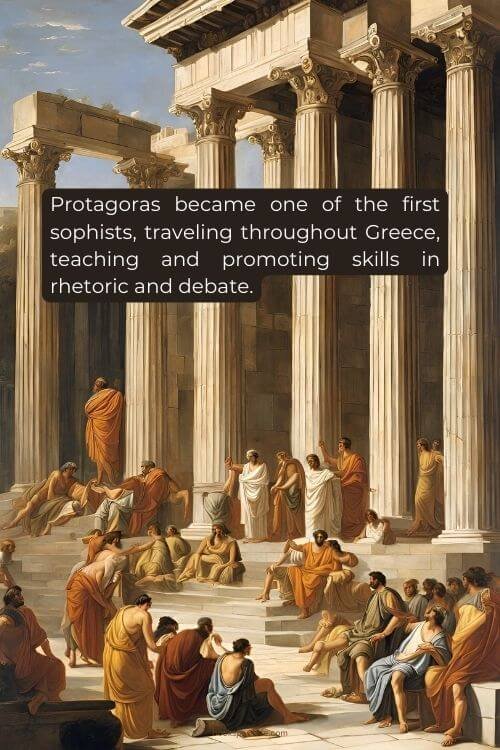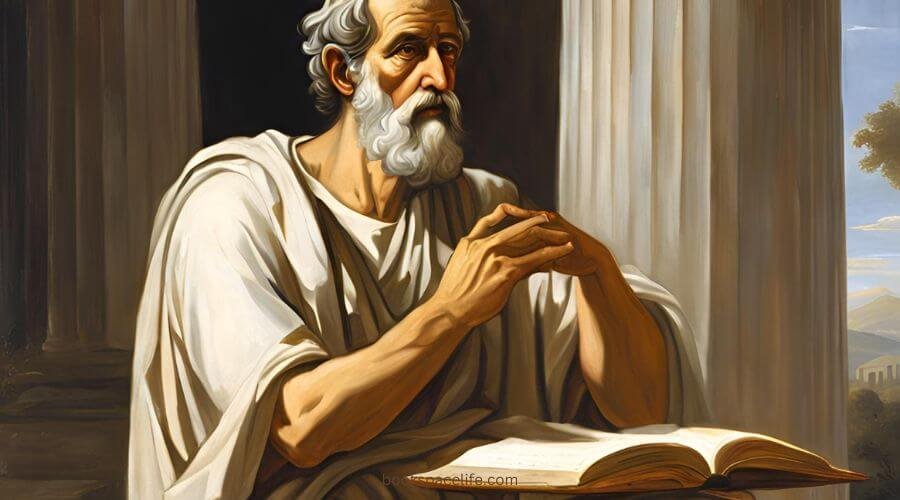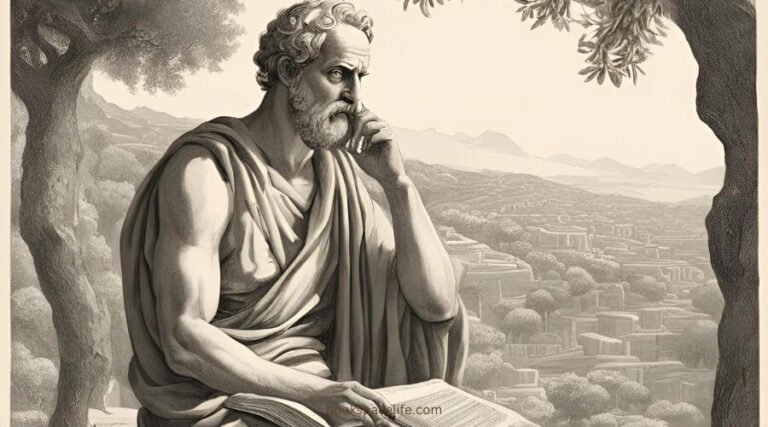Thales of Miletus
Protagoras: The Sophist Who Redefined Knowledge and Truth
Protagoras (490 – 420 BCE) is one of the most significant figures in ancient Greek philosophy, often recognized as the father of Sophism.
His contributions to the understanding of knowledge, truth, and ethics have sparked debates that continue to resonate in contemporary philosophical discourse.
Protagoras is best known for his claim that “man is the measure of all things,” suggesting a radical relativism that emphasizes individual perception in determining truth.
This blog post will delve into Protagoras’s life, travels, early education, philosophical contributions, and his lasting impact on Western thought.
Quick Read
Table of Contents
(1) Early Life and Education
Protagoras was born in Abdera, a city in Thrace, around 490 BCE.
Abdera was known as a center of learning and culture, providing a fertile ground for intellectual growth.
While details about his early life and education remain sparse, it is widely believed that Protagoras received a robust education that included exposure to various philosophical ideas.
Although specific teachers are not identified, Protagoras likely engaged with the early pre-Socratic philosophers, including Heraclitus and Parmenides, who influenced the development of his ideas about knowledge and existence.
The cultural milieu of Abdera, with its emphasis on rhetorical skills and education, would have played a significant role in shaping Protagoras’s intellectual pursuits.

(2) Travels and Philosophical Development
Protagoras’s philosophical journey was marked by extensive travels across Greece, where he engaged with diverse communities and ideas.
His most notable sojourns were to Athens, where he became a prominent figure in the intellectual circles of the time.
During this period, he interacted with influential figures such as Socrates, Plato, and various political leaders, further shaping his philosophical outlook.
Protagoras’s travels were not merely for personal enrichment; he also taught and established himself as a prominent educator of rhetoric and philosophy.
His emphasis on the practical applications of knowledge, particularly in the realm of public speaking and politics, reflected the Sophistic movement’s focus on rhetoric as a tool for success in civic life.
(3) Philosophical Contributions
- Man is the Measure of All Things: Protagoras is best known for his statement that “man is the measure of all things.”
This assertion embodies his philosophical relativism, suggesting that truth is not absolute but rather contingent upon individual perception.
According to Protagoras, different people may perceive the same situation in various ways, leading to different interpretations of truth.
This perspective challenged traditional notions of objective truth and emphasized the importance of subjective experience in understanding reality.
- Relativism and Epistemology: Protagoras’s relativism extends to epistemology, the study of knowledge.
He posited that knowledge is inherently subjective and shaped by personal experiences and cultural contexts.
This view questioned the possibility of universal truths, leading to debates about the nature of knowledge and its limitations.
Protagoras’s ideas paved the way for later philosophical inquiries into relativism and the nature of reality.
- Rhetoric and Education: As a Sophist, Protagoras placed great importance on rhetoric and its role in shaping public discourse.
He taught his students the art of persuasion, emphasizing the significance of eloquence in politics and civic engagement.
Protagoras believed that effective communication was essential for success in public life, and he equipped his students with the skills necessary to navigate the complexities of Athenian democracy.
His focus on rhetoric influenced the development of educational practices and rhetorical theory in ancient Greece.
- Ethics and Morality: Protagoras also contributed to ethical discussions, particularly regarding the nature of virtue. He argued that virtues are teachable and that individuals can learn to be virtuous through education and experience. This idea contrasted with the view that virtue is innate or divinely inspired.
Protagoras’s belief in the teachability of virtue had profound implications for moral philosophy, suggesting that ethical behavior could be cultivated through education.
- The Role of the Sophist: Protagoras’s identity as a Sophist is essential to understanding his philosophical contributions.
The Sophists were a group of itinerant teachers who traveled across Greece, offering education in rhetoric, grammar, and ethics.
They often challenged traditional beliefs and questioned the validity of absolute truths.
Protagoras’s work exemplifies the Sophistic approach to philosophy, characterized by a focus on practical knowledge, skepticism towards absolute values, and an emphasis on the relative nature of truth.

(4) Influence and Impact
Protagoras’s ideas and teachings had a lasting influence on philosophy, rhetoric, and education, shaping the trajectory of Western thought in various ways:
- Influence on Plato and Socratic Thought: Protagoras’s relativism and focus on subjective truth directly influenced Plato, who critiqued his ideas through the dialogues of Socrates.
In works such as “Theaetetus,” Plato engaged with Protagorean relativism, exploring the implications of subjective knowledge and the search for objective truth.
This dialectical engagement between Protagoras and Plato laid the groundwork for subsequent philosophical debates about knowledge and reality.
- Foundation for Modern Relativism: Protagoras is often regarded as a precursor to modern relativism, influencing contemporary discussions in epistemology and ethics.
His assertion that truth is contingent upon individual perception resonates with postmodern thought, which challenges the existence of absolute truths and emphasizes the importance of cultural and contextual factors in shaping knowledge.
- Impact on Rhetoric and Communication: Protagoras’s emphasis on rhetoric as a crucial skill for public life significantly influenced the development of rhetorical theory.
His teachings laid the foundation for later rhetoricians, such as Aristotle, who further explored the nature of persuasion and its role in civic discourse.
The focus on effective communication continues to be a vital component of education and public speaking today.
- Educational Practices: Protagoras’s contributions to education emphasized the importance of critical thinking, debate, and the exploration of diverse perspectives.
His teachings encouraged students to engage with different viewpoints, fostering an environment of intellectual inquiry.
This approach to education influenced subsequent pedagogical practices and laid the groundwork for the Socratic method, which emphasizes dialogue and questioning as tools for learning.
- Cultural Impact: Protagoras’s life and work reflect the dynamic intellectual culture of ancient Greece, characterized by a quest for knowledge and a willingness to challenge established beliefs.
His contributions represent a crucial moment in the transition from traditional philosophical thought to a more pragmatic, questioning approach to knowledge, setting the stage for the flourishing of philosophy in classical Greece.
- Legacy in Philosophy and Beyond: Protagoras’s legacy endures in the realms of philosophy, education, and rhetoric.
His ideas continue to inspire contemporary discussions about relativism, ethics, and the nature of truth.
The tension between subjective and objective perspectives remains a central theme in modern philosophy, reflecting the ongoing relevance of Protagorean thought in understanding the complexities of human experience.
(5) Conclusion
Protagoras emerges as a central figure in the history of philosophy, whose innovative ideas about knowledge, truth, and ethics have left a lasting imprint on Western thought.
His assertion that “man is the measure of all things” challenged conventional beliefs about absolute truth and emphasized the importance of individual perception in shaping reality.
Through his reflections on relativism and the role of rhetoric in public life, Protagoras encouraged a critical examination of knowledge and ethics, fostering an environment of intellectual inquiry that continues to resonate in contemporary discourse.
His contributions to education and the development of rhetorical skills reflect the significance of effective communication in navigating the complexities of civic life.
As we contemplate Protagoras’s life and teachings, we are invited to consider the implications of relativism and the nature of truth in our own lives.
His work serves as a testament to the power of philosophical inquiry and the importance of engaging critically with our beliefs, inspiring us to explore the multifaceted nature of existence and the diverse perspectives that shape our understanding of the world.
(A) 7 Quick Facts on Protagoras
- Date of Birth – Protagoras was born around 490 BCE, during the early stages of Greek philosophy.
- Place of Birth – He was born in Abdera, a city in Thrace, located in modern-day northeastern Greece.
- Early Education – Protagoras likely studied under earlier philosophers and sophists, gaining knowledge in rhetoric, ethics, and political thought.
- Sophist Movement – He became one of the first sophists, traveling throughout Greece, teaching and promoting skills in rhetoric and debate.
- Famous Quote – Protagoras is known for saying, “Man is the measure of all things,” highlighting his relativistic views on truth and knowledge.
- Influence in Athens – He traveled to Athens, where he became influential, teaching prominent figures and engaging in political discourse.
- Legal Involvement – Protagoras was involved in legal matters and defended the importance of persuasive speaking in the art of law and public life.
(B) 10 Quotes attributed to Protagoras
- Man is the measure of all things. This famous assertion emphasizes the relativity of truth and knowledge based on human perception.
- Concerning the gods, I have no means of knowing either that they exist or do not exist. Protagoras highlights the uncertainty regarding divine existence, advocating for a skeptical approach.
- It is not easy to be a good man. Acknowledging the complexities and challenges involved in achieving moral goodness.
- As far as I can tell, every man has his own truth. Suggesting that individual perspectives shape our understanding of reality.
- Wisdom is the knowledge of good and evil. Defining wisdom in terms of moral understanding and ethical discernment.
- To be a good speaker is to be able to persuade others. Emphasizing the importance of rhetoric and persuasive communication in public life.
- All things are in a state of flux. Reflecting the idea that change is constant and inherent in the world.
- No man is able to give another a clear and certain opinion about what is right. Stressing the subjective nature of morality and ethical judgments.
- Each individual has his own measure of things. Reinforcing the notion that personal experience shapes one’s understanding of reality.
- It is difficult to teach virtue; it is easier to teach knowledge. Acknowledging the complexities involved in imparting ethical values compared to factual knowledge.








